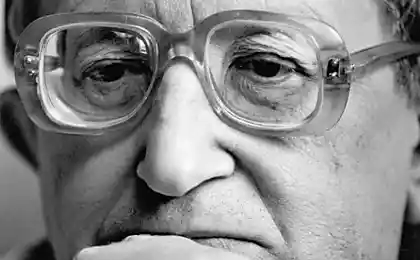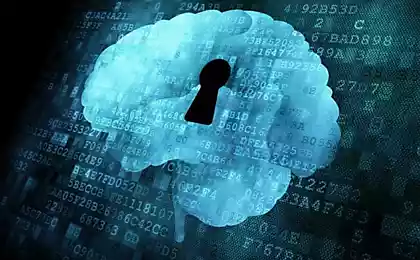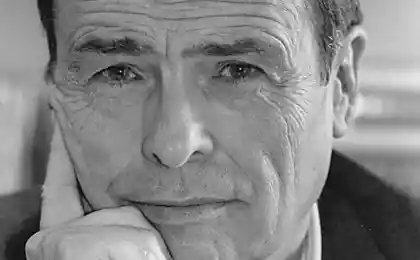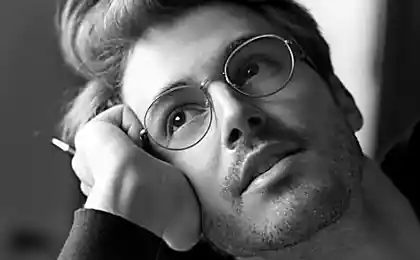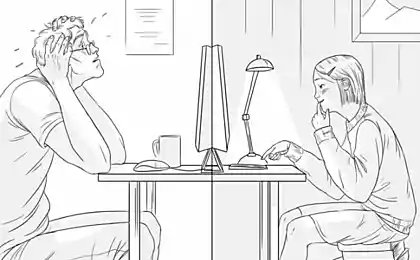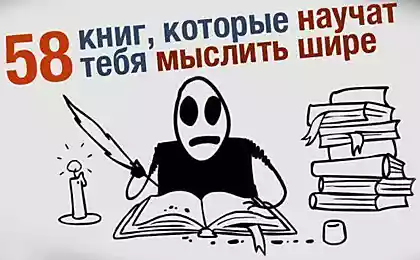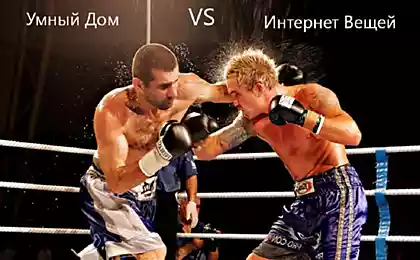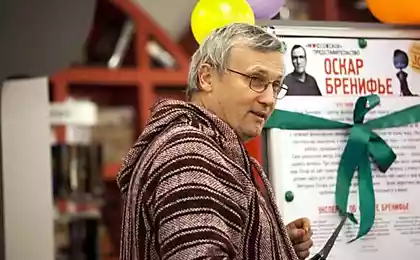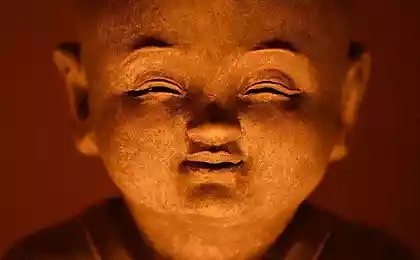729
Strugatsky brothers: questions and answers
Forty one million four hundred sixty five thousand eight hundred seventy seven
"So, your books you read as a child"
On the books by Arkady and Boris Strugatsky has inspired generations of Soviet, post-Soviet and just readers. In the 60-70 years of the twentieth century excerpts from their works quoted by heart, and this knowledge is in the environment of thinking, looking for, reading people has become a real recognition system: the "your" to you or "alien"...
There was a time when they were published and books were copied by hand, acitively on tape for one night because in the morning we had to return secretly handed over the manuscript...
Much later, when he left this world first, the eldest of the brothers Arkady and Boris, and then, many began to say that they changed the Outlook of generations, what with their departure ended in our lives something very important, some kind of immutable morality, that is the end of an era...
Cosmonaut Georgy Grechko once admitted that he had taken with him into space three books — as a symbol and tribute to those, thanks to whom he rose to such heights. One of these three books were "Hard to be God" by Strugatsky brothers...
Alexey Herman-the senior decided to shoot a film "Hard to be God" in 1968, but then due to certain political reasons, he failed. He was able to begin to realize our plans only in 1999 and filmed until his death in 2013. The film was released after the death of the great Director...
I also grew and matured on the books of the Strugatsky. Once was enough for me to read them, to admire the plot, sparkling humor, to solve the famous mysteries of the ABS (the so-called writers are fans of their work). I was just wondering, because the brothers once and for all at the beginning of my writing journey I decided that no matter how deep and complex it may be raised in the book the questions, first of all, it should be INTERESTING to read. And now I ask myself: what in the works of the Strugatsky that makes many, many readers attributed them to the category of the most important books of your life?
Fiction Strugatsky — it's not genre, not subject, is a special kind of thinking, thinking about man and humanity, about what is happening to us and where we are going. Fantastic ABS — it's about choice and courage, about the yearning and search, about the senselessness and dream about idealism and cowardice, about the past, present and certainly future. It's all about us, ordinary people, in the given circumstances.
A distinctive feature of their books is that they do not give direct answers. They only raise questions, so that each reader was looking for answers myself. In a recent interview, Boris Strugatsky says: "works of literature should not be taught, but to cause maximum empathy. The book is a stimulant to the work of the soul. "The soul is obliged to work both day and night." Life is also a stimulant, but is merciless. And the book is gentle and kind."
"Noon. XXII Vek"
After a series of first joint of short stories and novels in 1962, the Strugatsky brothers write very important for their further creativity book "Noon. XXII century". This book paints the world of a bright Communist future in which they, like most others then, sincerely believed. They create a scenery that will live the characters and the events develop many subsequent works the ABS. Later this world will get the strugatskys and their readers name the World of Noon.
In this world there is hunger, disease, war, and housing problems. There is a self-propelled road, and interstellar space ships, it has a wonderful environment... But not the main thing. There live beautiful, kind, cheerful and courageous people, people-creators, people-the researchers. They realized that each person need to find his main talent, his destiny, and, therefore, the most respected profession on Earth is not zvezdolety, and the Teacher. A world in which no "lead abominations of life." In the world immediately wants to move and to become friends with his heroes and stay there.
Is it possible to build such a world in the near future? Probably not, and Strugatsky is well understood. "It's just the World-in-which-we-would-like-to live," will again and again reply, they are those who again and again will ask, do they believe in the reality of the World of Noon.
And as always with ABS, this world is not sterile, it's alive and real and evolving on their own, not originally planned scenarios. Man of the XXII century masters the other planets and starts to help those who have these planets inhabits. In "Hard to be God" for the first time in the works of writers with all the ruthlessness heard the question, and whether a person has the right to intervene — even with the best of intentions in the lives of others. But most importantly, along with light world of Noon, how come the Earthmen, in the book appears the medieval world arkanara, somewhere out there on another planet... And attentive reader guessing that this isn't Earth and Arkanar, and not even the past and the future, and two possible options for our future...
Re-reading "Hard to be God" and other books about the World of ABS Noon ("Inhabited island", "escape Attempt", "Boyfriend from hell", "rainbow"), you understand that all of them — not on other planets. Indeed, in the earlier "Interns" writers said (and was faithful to it to the end): "it's Important on Earth." Yet they have hope that the World of Noon still win...
"The world in which we live I'm afraid"
But what was happening around, leaving no hope... And to change the World-in-which-we-wanted-to-live comes to the World-in-which-we-live-fear.
"Predatory things of the century" turned out to be (against the will of the authors) a fairly accurate prediction. Then, in 1965, seemed a grotesque dystopia (because a lot of described was not then even in the West), today is not a fiction. Humanity country after country enters this state, the state of consumer Society; it is the norm and not at all scary. Strugatsky themselves later admitted that it was not the worst of all possible scenarios, because in it, at least, is freedom to live a meaningless illusory things and entertainment or fight against this cult prey items. But the attentive reader will find in the books of ABS thoughts that will dispel this optimism, because "where the triumphant mediocrity, to power always come black"...
Why, why in the World-in-which-we-wanted-to live is likely, according to Strugatsky, will not be for a very long time? It's all in the person. No one, alas, this world to create, because the system generates the vast majority of people, it absolutely are unable to. The hero of one of the most famous works ABS "roadside picnic", after going through the mud, the blood, the pain of his Stalker life, actually killing an innocent guy to meet up with a Golden Ball, fulfilling the cherished desire with horror and despair realizes that to ask the Ball he has nothing, because never in his life had he thought about what he — really- wants.
This is one of the most poignant and desperate moments in the books ABS. "He froze some terrible premonitions... baseness, Meanness... And here they beat me, no tongue left, bastards... Punks. How were the punks, the punks and old... this should not be! Do you hear? In the future this once and for all was forbidden! Man is born to think (there he is, Kirill, finally!..). Just because I don't believe it. And never believed and now do not believe, and why man is born — I don't know. Born here and born. Feed someone in that much. May we all be healthy, and they let them all starve. Who is we? Who are they? Nothing to understand... Now he was sitting with his eyes closed hands, and tried to understand, not to think, but at least to see something as it should be, but again he saw only the snout, snout, snout... and greenbacks, bottles, piles of rags that were once people, and columns of numbers... He knew that all this must be destroyed, and he wanted to destroy it, but he guessed that if all this will be destroyed then there will be nothing — just smooth bare earth... He no longer tried to think. He was just saying to herself with despair, like a prayer: "I'm an animal, you see, I'm an animal. I have no words, I never learned how, I do not know how to think, the bastards didn't let me learn how to think. But if you really like... Almighty, omnipotent, compassionate, deal with it! Look into my soul, I know — it's got everything you need. Should be. The soul-in fact I never sold! She's my human! You take from me what I want, it just can't be that I would want something bad!"
"Roadside picnic" is a tragedy of man, for the first time left alone with his soul, and there — emptiness.
"The wolf tells her cubs: "Bite like me", and that is enough, and teaches zaychiha leverets: "I run Away", and this is also quite, but the man-cub teaches: "Think like me", and this is a crime..." ("the Ugly swans").
The world of Noon can only be built by people who know how to think, people are not spoiled consumer society. Only where to take them, not one, not two, not several, and necessary to this world to create?
"Surgeons lot, of therapists there"
"The ugly swans", "Burdened with evil or Forty years later" is a reflection about how they can receive these new people. Even the most mysterious works of the ABS "the doomed city" and "the Snail on the slope" is partly about that — about longing for another life, the desire to break out of the old, hateful world you.
But what is a long and complicated process! Hero "Burdened with evil", by none other than the Savior come again to look for his successor in the salvation of this world, steeped in evil, with pain exclaims, "Surgeons lot, of therapists there!" And the world doesn't need surgery-revolutionaries, but we need educators and teachers who must be willing to work not one century. Because the World of Noon "unreal and unreal until then, until we learn to do something with a monkey sitting inside each of us." Dare we do this the hard way, or prefer not to live in the world arkanara and Saraksh?
At the end of life more and more sounded bitter in the words of Boris Strugatsky. "The world of Noon, it is "just" world in which we, the authors, would like to live and work. You're absolutely right: this world seems to be unattainable, because it needs people who are Educated People, whose Supreme enjoyment and a sense of existence is the successful creative work. Where a Man will take, how it will turn out to turn into his current human — Homo habilis (the meaning of life is — increase the diversity, quantity and quality of consumption), I don't know... I am a supporter of a High system of education, the most important element of which is detected by the professionals (Teachers) the main talent of the child and to create conditions for the development of this talent. This position is easily questioned and criticized, but the trouble is not even that. Not only that, even the General principles of such a system are not yet set, is absolutely not visible the social forces that were interested in the appearance of Educated. Neither of the parties these are not visible, nor class, nor even of religious teachings (and they're so diverse!). The Skilled person is satisfied of all."
To Think Future
The world in which we live depends on us. If Strugatsky something and teach is to think about the Future (think Future, as told to children "the Ugly swans"). Not that that will come in a year or even ten, but about the distant future of mankind in which to live for our children, grandchildren and great-grandchildren. On the question of pushing books ABS to unusual and startling future, Boris Strugatsky said: "You are right in the sense that we both do has always attached particular importance to the Future, in the broadest sense of the word. Past and present interested us rather as a material for the Future, rather than themselves. It certainly imposes a specific imprint on all of our work, and our lives. But to answer Your question, I can't primarily because it seems to me the wrong set. It is not about us. We never put him before You formulated problems (except that at the first stage of work, the commercials until the 60th) and therefore sought other guidance than You called. I would venture to say that all our (and Your) life is the movement from misunderstanding and ignorance to knowledge and understanding. It is on this path waiting for us and joy and sorrow and discovery, and victory, and crushing defeat, and — alas! — how little depends on us in this way! But, of course, still depends. The road by walking. Knowledge is given to those who seek. But if you want something to happen in a hundred years — start today".
Questions, questions...
But questions remain Strugatsky pain inside and do not give you peace...
What to say to Almighty God (the unknown car, the Golden Ball), which takes only the innermost desires?
How can you help another if your heart is full of pity, not to harm, not make things worse?
What is more important — the security of all or one?
How to leave those who do not want a better life and a better world, and go forward without them or to try again and again to convey to them the importance and beauty changes?
What do you choose when the choice will come into your life, the welfare of his family or loyalty to the once chosen path? There is the duty which one is more important? And at stake is your right to respect yourself...
Questions that cannot be answered and which not to answer. For them is the moral choice, of the correctness of which no one can never be sure until the end. But this question, the eternal "to be or not to be" and makes us human.
PS
However, some answers in books Strugatsky still there, if you read carefully. Mouth your favorite character of Gorbovsky they give us a criterion for many life choices: "Of all possible solutions choose the good. Not the most promising, not the most rational, not the most progressive, and certainly not the most effective — the most good."
Additionally:
"But still? Here I may be a wizard. And I tell you: make three wishes. All what you want. The most fabulous. And I will grant them. Well?
She thought hard, her shoulders dropped. Then her face cleared.
— I never felt old! she said.
"Fine," I said. Again.
— I... — Inspired she began and stopped.
I loved to ask this question and ask it at every opportunity. Several times I asked my guys even essays on the theme of "Three wishes". And I was always excited to see what thousands of men and women, elderly and children only two or three dozen figured that it is possible to wish not only for themselves personally and for the closest to you people, but for the large world, for humanity as a whole. No, it wasn't a testimony to the indestructibility of human selfishness, desire is not always been purely selfish, and the majority of respondents then, when I reminded them about the missed opportunities and the great universal problems, recalls, quite frankly was angry and blamed me that I didn't tell you. But anyway all of them began their answer with something like, "me..." where he showed some age-old subconscious belief that your personal desires can't change anything in the big world you have a magic wand or not, no matter..."
"Predatory things century"
"They became silent, and Zhilin again felt the nagging feeling of uncertainty, not leaving it for several years now. It's like every time he goes in flight on the Ground is something incredibly important, the most important thing for people is extremely important, more important than the rest of the Universe, more important than the most wonderful creations of human hands.
On the Ground were men, youth, children. There were millions and millions of these kind of Eureka and Zhilin felt great to help them, at least some of them. Still where. In the school internat. Or in a factory club. Or in the House of pioneers. Help them to enter life, to help find themselves, to define their place in the world, to teach them to want to direct a lot to teach to want to work excitedly.
To teach not to bow to authority, but to examine them and compare their teachings with life.
To teach people to be wary of the experience of experienced people, because life is changing extremely fast.
To learn to despise the petty-bourgeois wisdom.
To teach, to love and to cry love is not a shame.
To teach skepticism and cynicism in life is cheap that it's a lot easier and more boring than to be surprised and enjoy life.
Learn to trust the movements of the soul of his neighbor.
To teach that it is better twenty times be mistaken in the man, than treated with suspicion by everyone.
To teach that it is not how you affect others, and how you affect others.
And teach them that one person is not worth a damn".
The interns
From the interview:
Question: I Have an obsessive view that the core theme through most of Your work is the idea of tolerance of others not like you. Even in "the Waves extinguish wind" the theme of xenophobia was used, perhaps, rather than as a means of selection of future vations, but as a means to convey to the reader the idea of having to learn to accept different world (in the broadest sense of the word) with the appropriate degree of respect and understanding. And "Beetle" as in the precursor "Waves" is probably the key point is not the question "Should Sikorsky was to kill Abalkina," and the question "How to overcome your fear and revulsion for what we do not understand or do not correspond to our ideas about morality and a different way of life." Progressive development and dialogue (contact) can begin only when all sides to overcome mutual fear and loathing... do I understand this?
In my opinion, nationalism, anti-Semitism, homophobia, etc. — all are one, giving rise to various forms of fascism and its supply...
BNS: do You see us is absolutely correct. You mentioned the idea of ABS is present in almost all their works, regardless of theme and plot. And about nationalism and things I absolutely agree with You.
Interestingly, when we only just started writing (mid-1950s) the idea of nationalism seemed (at least in our circle) is completely outdated, the idea without a future, the rest in the past, absolutely and forever discredited by the Nazis. But no! Alive and kicking. And yet survive. Unfortunately.
Author: Natalia Zhdanova
Source: bez-granic.ru/index.php/2013-08-04-13-26-15/vse-rubriki-zhurnala/otkryvaya-mir-rebenka/2109-voprosy-i-otvety-bratev-strugatskikh.html
"So, your books you read as a child"
On the books by Arkady and Boris Strugatsky has inspired generations of Soviet, post-Soviet and just readers. In the 60-70 years of the twentieth century excerpts from their works quoted by heart, and this knowledge is in the environment of thinking, looking for, reading people has become a real recognition system: the "your" to you or "alien"...
There was a time when they were published and books were copied by hand, acitively on tape for one night because in the morning we had to return secretly handed over the manuscript...
Much later, when he left this world first, the eldest of the brothers Arkady and Boris, and then, many began to say that they changed the Outlook of generations, what with their departure ended in our lives something very important, some kind of immutable morality, that is the end of an era...
Cosmonaut Georgy Grechko once admitted that he had taken with him into space three books — as a symbol and tribute to those, thanks to whom he rose to such heights. One of these three books were "Hard to be God" by Strugatsky brothers...
Alexey Herman-the senior decided to shoot a film "Hard to be God" in 1968, but then due to certain political reasons, he failed. He was able to begin to realize our plans only in 1999 and filmed until his death in 2013. The film was released after the death of the great Director...
I also grew and matured on the books of the Strugatsky. Once was enough for me to read them, to admire the plot, sparkling humor, to solve the famous mysteries of the ABS (the so-called writers are fans of their work). I was just wondering, because the brothers once and for all at the beginning of my writing journey I decided that no matter how deep and complex it may be raised in the book the questions, first of all, it should be INTERESTING to read. And now I ask myself: what in the works of the Strugatsky that makes many, many readers attributed them to the category of the most important books of your life?
Fiction Strugatsky — it's not genre, not subject, is a special kind of thinking, thinking about man and humanity, about what is happening to us and where we are going. Fantastic ABS — it's about choice and courage, about the yearning and search, about the senselessness and dream about idealism and cowardice, about the past, present and certainly future. It's all about us, ordinary people, in the given circumstances.
A distinctive feature of their books is that they do not give direct answers. They only raise questions, so that each reader was looking for answers myself. In a recent interview, Boris Strugatsky says: "works of literature should not be taught, but to cause maximum empathy. The book is a stimulant to the work of the soul. "The soul is obliged to work both day and night." Life is also a stimulant, but is merciless. And the book is gentle and kind."
"Noon. XXII Vek"
After a series of first joint of short stories and novels in 1962, the Strugatsky brothers write very important for their further creativity book "Noon. XXII century". This book paints the world of a bright Communist future in which they, like most others then, sincerely believed. They create a scenery that will live the characters and the events develop many subsequent works the ABS. Later this world will get the strugatskys and their readers name the World of Noon.
In this world there is hunger, disease, war, and housing problems. There is a self-propelled road, and interstellar space ships, it has a wonderful environment... But not the main thing. There live beautiful, kind, cheerful and courageous people, people-creators, people-the researchers. They realized that each person need to find his main talent, his destiny, and, therefore, the most respected profession on Earth is not zvezdolety, and the Teacher. A world in which no "lead abominations of life." In the world immediately wants to move and to become friends with his heroes and stay there.
Is it possible to build such a world in the near future? Probably not, and Strugatsky is well understood. "It's just the World-in-which-we-would-like-to live," will again and again reply, they are those who again and again will ask, do they believe in the reality of the World of Noon.
And as always with ABS, this world is not sterile, it's alive and real and evolving on their own, not originally planned scenarios. Man of the XXII century masters the other planets and starts to help those who have these planets inhabits. In "Hard to be God" for the first time in the works of writers with all the ruthlessness heard the question, and whether a person has the right to intervene — even with the best of intentions in the lives of others. But most importantly, along with light world of Noon, how come the Earthmen, in the book appears the medieval world arkanara, somewhere out there on another planet... And attentive reader guessing that this isn't Earth and Arkanar, and not even the past and the future, and two possible options for our future...
Re-reading "Hard to be God" and other books about the World of ABS Noon ("Inhabited island", "escape Attempt", "Boyfriend from hell", "rainbow"), you understand that all of them — not on other planets. Indeed, in the earlier "Interns" writers said (and was faithful to it to the end): "it's Important on Earth." Yet they have hope that the World of Noon still win...
"The world in which we live I'm afraid"
But what was happening around, leaving no hope... And to change the World-in-which-we-wanted-to-live comes to the World-in-which-we-live-fear.
"Predatory things of the century" turned out to be (against the will of the authors) a fairly accurate prediction. Then, in 1965, seemed a grotesque dystopia (because a lot of described was not then even in the West), today is not a fiction. Humanity country after country enters this state, the state of consumer Society; it is the norm and not at all scary. Strugatsky themselves later admitted that it was not the worst of all possible scenarios, because in it, at least, is freedom to live a meaningless illusory things and entertainment or fight against this cult prey items. But the attentive reader will find in the books of ABS thoughts that will dispel this optimism, because "where the triumphant mediocrity, to power always come black"...
Why, why in the World-in-which-we-wanted-to live is likely, according to Strugatsky, will not be for a very long time? It's all in the person. No one, alas, this world to create, because the system generates the vast majority of people, it absolutely are unable to. The hero of one of the most famous works ABS "roadside picnic", after going through the mud, the blood, the pain of his Stalker life, actually killing an innocent guy to meet up with a Golden Ball, fulfilling the cherished desire with horror and despair realizes that to ask the Ball he has nothing, because never in his life had he thought about what he — really- wants.
This is one of the most poignant and desperate moments in the books ABS. "He froze some terrible premonitions... baseness, Meanness... And here they beat me, no tongue left, bastards... Punks. How were the punks, the punks and old... this should not be! Do you hear? In the future this once and for all was forbidden! Man is born to think (there he is, Kirill, finally!..). Just because I don't believe it. And never believed and now do not believe, and why man is born — I don't know. Born here and born. Feed someone in that much. May we all be healthy, and they let them all starve. Who is we? Who are they? Nothing to understand... Now he was sitting with his eyes closed hands, and tried to understand, not to think, but at least to see something as it should be, but again he saw only the snout, snout, snout... and greenbacks, bottles, piles of rags that were once people, and columns of numbers... He knew that all this must be destroyed, and he wanted to destroy it, but he guessed that if all this will be destroyed then there will be nothing — just smooth bare earth... He no longer tried to think. He was just saying to herself with despair, like a prayer: "I'm an animal, you see, I'm an animal. I have no words, I never learned how, I do not know how to think, the bastards didn't let me learn how to think. But if you really like... Almighty, omnipotent, compassionate, deal with it! Look into my soul, I know — it's got everything you need. Should be. The soul-in fact I never sold! She's my human! You take from me what I want, it just can't be that I would want something bad!"
"Roadside picnic" is a tragedy of man, for the first time left alone with his soul, and there — emptiness.
"The wolf tells her cubs: "Bite like me", and that is enough, and teaches zaychiha leverets: "I run Away", and this is also quite, but the man-cub teaches: "Think like me", and this is a crime..." ("the Ugly swans").
The world of Noon can only be built by people who know how to think, people are not spoiled consumer society. Only where to take them, not one, not two, not several, and necessary to this world to create?
"Surgeons lot, of therapists there"
"The ugly swans", "Burdened with evil or Forty years later" is a reflection about how they can receive these new people. Even the most mysterious works of the ABS "the doomed city" and "the Snail on the slope" is partly about that — about longing for another life, the desire to break out of the old, hateful world you.
But what is a long and complicated process! Hero "Burdened with evil", by none other than the Savior come again to look for his successor in the salvation of this world, steeped in evil, with pain exclaims, "Surgeons lot, of therapists there!" And the world doesn't need surgery-revolutionaries, but we need educators and teachers who must be willing to work not one century. Because the World of Noon "unreal and unreal until then, until we learn to do something with a monkey sitting inside each of us." Dare we do this the hard way, or prefer not to live in the world arkanara and Saraksh?
At the end of life more and more sounded bitter in the words of Boris Strugatsky. "The world of Noon, it is "just" world in which we, the authors, would like to live and work. You're absolutely right: this world seems to be unattainable, because it needs people who are Educated People, whose Supreme enjoyment and a sense of existence is the successful creative work. Where a Man will take, how it will turn out to turn into his current human — Homo habilis (the meaning of life is — increase the diversity, quantity and quality of consumption), I don't know... I am a supporter of a High system of education, the most important element of which is detected by the professionals (Teachers) the main talent of the child and to create conditions for the development of this talent. This position is easily questioned and criticized, but the trouble is not even that. Not only that, even the General principles of such a system are not yet set, is absolutely not visible the social forces that were interested in the appearance of Educated. Neither of the parties these are not visible, nor class, nor even of religious teachings (and they're so diverse!). The Skilled person is satisfied of all."
To Think Future
The world in which we live depends on us. If Strugatsky something and teach is to think about the Future (think Future, as told to children "the Ugly swans"). Not that that will come in a year or even ten, but about the distant future of mankind in which to live for our children, grandchildren and great-grandchildren. On the question of pushing books ABS to unusual and startling future, Boris Strugatsky said: "You are right in the sense that we both do has always attached particular importance to the Future, in the broadest sense of the word. Past and present interested us rather as a material for the Future, rather than themselves. It certainly imposes a specific imprint on all of our work, and our lives. But to answer Your question, I can't primarily because it seems to me the wrong set. It is not about us. We never put him before You formulated problems (except that at the first stage of work, the commercials until the 60th) and therefore sought other guidance than You called. I would venture to say that all our (and Your) life is the movement from misunderstanding and ignorance to knowledge and understanding. It is on this path waiting for us and joy and sorrow and discovery, and victory, and crushing defeat, and — alas! — how little depends on us in this way! But, of course, still depends. The road by walking. Knowledge is given to those who seek. But if you want something to happen in a hundred years — start today".
Questions, questions...
But questions remain Strugatsky pain inside and do not give you peace...
What to say to Almighty God (the unknown car, the Golden Ball), which takes only the innermost desires?
How can you help another if your heart is full of pity, not to harm, not make things worse?
What is more important — the security of all or one?
How to leave those who do not want a better life and a better world, and go forward without them or to try again and again to convey to them the importance and beauty changes?
What do you choose when the choice will come into your life, the welfare of his family or loyalty to the once chosen path? There is the duty which one is more important? And at stake is your right to respect yourself...
Questions that cannot be answered and which not to answer. For them is the moral choice, of the correctness of which no one can never be sure until the end. But this question, the eternal "to be or not to be" and makes us human.
PS
However, some answers in books Strugatsky still there, if you read carefully. Mouth your favorite character of Gorbovsky they give us a criterion for many life choices: "Of all possible solutions choose the good. Not the most promising, not the most rational, not the most progressive, and certainly not the most effective — the most good."
Additionally:
"But still? Here I may be a wizard. And I tell you: make three wishes. All what you want. The most fabulous. And I will grant them. Well?
She thought hard, her shoulders dropped. Then her face cleared.
— I never felt old! she said.
"Fine," I said. Again.
— I... — Inspired she began and stopped.
I loved to ask this question and ask it at every opportunity. Several times I asked my guys even essays on the theme of "Three wishes". And I was always excited to see what thousands of men and women, elderly and children only two or three dozen figured that it is possible to wish not only for themselves personally and for the closest to you people, but for the large world, for humanity as a whole. No, it wasn't a testimony to the indestructibility of human selfishness, desire is not always been purely selfish, and the majority of respondents then, when I reminded them about the missed opportunities and the great universal problems, recalls, quite frankly was angry and blamed me that I didn't tell you. But anyway all of them began their answer with something like, "me..." where he showed some age-old subconscious belief that your personal desires can't change anything in the big world you have a magic wand or not, no matter..."
"Predatory things century"
"They became silent, and Zhilin again felt the nagging feeling of uncertainty, not leaving it for several years now. It's like every time he goes in flight on the Ground is something incredibly important, the most important thing for people is extremely important, more important than the rest of the Universe, more important than the most wonderful creations of human hands.
On the Ground were men, youth, children. There were millions and millions of these kind of Eureka and Zhilin felt great to help them, at least some of them. Still where. In the school internat. Or in a factory club. Or in the House of pioneers. Help them to enter life, to help find themselves, to define their place in the world, to teach them to want to direct a lot to teach to want to work excitedly.
To teach not to bow to authority, but to examine them and compare their teachings with life.
To teach people to be wary of the experience of experienced people, because life is changing extremely fast.
To learn to despise the petty-bourgeois wisdom.
To teach, to love and to cry love is not a shame.
To teach skepticism and cynicism in life is cheap that it's a lot easier and more boring than to be surprised and enjoy life.
Learn to trust the movements of the soul of his neighbor.
To teach that it is better twenty times be mistaken in the man, than treated with suspicion by everyone.
To teach that it is not how you affect others, and how you affect others.
And teach them that one person is not worth a damn".
The interns
From the interview:
Question: I Have an obsessive view that the core theme through most of Your work is the idea of tolerance of others not like you. Even in "the Waves extinguish wind" the theme of xenophobia was used, perhaps, rather than as a means of selection of future vations, but as a means to convey to the reader the idea of having to learn to accept different world (in the broadest sense of the word) with the appropriate degree of respect and understanding. And "Beetle" as in the precursor "Waves" is probably the key point is not the question "Should Sikorsky was to kill Abalkina," and the question "How to overcome your fear and revulsion for what we do not understand or do not correspond to our ideas about morality and a different way of life." Progressive development and dialogue (contact) can begin only when all sides to overcome mutual fear and loathing... do I understand this?
In my opinion, nationalism, anti-Semitism, homophobia, etc. — all are one, giving rise to various forms of fascism and its supply...
BNS: do You see us is absolutely correct. You mentioned the idea of ABS is present in almost all their works, regardless of theme and plot. And about nationalism and things I absolutely agree with You.
Interestingly, when we only just started writing (mid-1950s) the idea of nationalism seemed (at least in our circle) is completely outdated, the idea without a future, the rest in the past, absolutely and forever discredited by the Nazis. But no! Alive and kicking. And yet survive. Unfortunately.
Author: Natalia Zhdanova
Source: bez-granic.ru/index.php/2013-08-04-13-26-15/vse-rubriki-zhurnala/otkryvaya-mir-rebenka/2109-voprosy-i-otvety-bratev-strugatskikh.html
